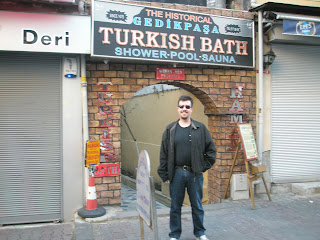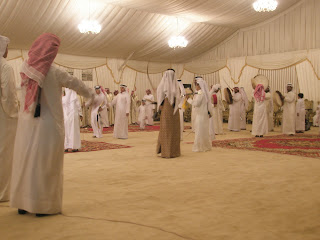The second annual Doha Tribeca Film Festival has started so I have once again got tickets to a wide variety of films.
I've always liked film festivals because it allows you to see independent films that you might not ever see otherwise. Not that all of the films are independent, I usually see one or two Hollywood films as well, but it looks like this year more of the films are foreign-language, especially from the Middle East and North Africa. I just pick films based on what I think looks interesting, from there it's a real spin of the roulette wheel. Many of the films are not great but occasionally you find real "diamonds in the rough". I remember watching Born into Brothels at the film festival in Bermuda and briefly meeting the directors. Less than a year later they were collecting the Academy Award for best documentary -- beating out the more well-known Super Size Me.
So here's an overview of the first films I saw. At each film you're given a ballot so that you can vote on a scale of 1 to 5 (1 being bad and 5 being awesome), I have also provided the ratings I gave the film:
Waiting for Superman
Attendance: 100% - full house.
A documentary about the state of the US public school system and how in many cities there are charter schools or magnet schools that are also public but do a much better job educating children. Unfortunately these schools only have so much space and always receive more applications than available seats, in some cases 20 times as many,
so each state’s regulations require that the children who are accepted are determined by lottery. The film follows five children and their families, each in different cities, as they try to get their children into the schools so that they will not be stuck in underperforming public schools (some of which are so bad one expert referred to them as "dropout factories"). The film also points out reasons why many public schools don't perform, and talks to various experts or individuals trying to reform the system. The film especially singles out the fact that in almost no state can you fire a teacher thanks to union contracts, allowing really bad teachers to continue educating (charter/magnet schools are allowed to have non-union teachers).
I've always had an interest in education but at times I felt that the film was a bit long on preaching narrative so it dragged in some places. It also didn't seem to give a fair shake to unions and supporters of the public school system to answer the criticisms in the film. That said you do get to know the children and their families, and at the end when the film follows the families to their various lotteries you find yourself wishing that the child's name gets called. The film made it clear, will this child go on to a public school where they will likely not learn much and eventually dropout, or go to a school where the chances of them graduating and going on to college are more than 80%? And it all comes down to their name being drawn out of a box, or that bingo ball matching their number tumbling out. Why does it have to be like this in America?
Rating: 4/5. Definitely worth seeing, though a bit long at times
Legend of the Fist: the Return of Chen Zen
Attendance: 25%, but it was in a huge venue and started at 1030 at night on a weekday.
A Hong Kong (or possibly Chinese) martial arts film that takes place in Shanghai in the 1920s.
First a bit about the venue. This movie was shown at the Four Seasons Hotel on their beach, so patrons sat on beach chairs, toes in the sand, and watched the film on a big screen. Because it was a hotel they served beer. I think it's the first time I'd ever seen a film in a theater that provided beer -- and it was in the Middle East! The weather was pleasant and there were no issues with the sound. Had it been a bit windy here I think the waves lapping up against the shore might have caused a bit of background noise but this night the waters were calm.
As for the film it was a bit all over the place and tried to incorporate too many elements. At times it was a war film, film noir, an action film, a romance, a spy film, a political film, it just didn't seem to know what it wanted to do. A lot of cliché elements to it and the fight scenes weren't that great.
Rating: 2/5. You'd be much better off watching Crouching Tiger, Hidden Dragon, a Bruce Lee film, or Hero.
A Throw of Dice
Attendance: 60%, and it was in the biggest venue at the festival
A free showing of a 1929 silent film about two kings and the lovely Princess they both desire, set in India during the time of the Raj. What made this showing special was that a musical score had been composed for it which was played live by the Qatar Philharmonic Orchestra while the film was being screened.
The venue was the Katara Open-Air Theater at the newly-opened Cultural City. I estimate it could probably seat about 800 people.
The movie was pretty good at it looked to me like it was really set in India and had Indian actors. Because it was the time of the Raj everyone was dressed in elaborate costumes, had huge palaces, tons of servants and so forth. The plot was pretty conventional, an Evil King, a Good King, a love story, and the evil King using rigged dice to get the good King's Kingdom (hence the title). The evil King is defeated, the good King gets his kingdom back and wins the hand of the beautiful princess, and vows never to gamble again. The orchestra did a great job and I don't think the movie would've been quite as good to watch without it.
Rating: 4/5. A unique experience watching a film with a live 75-piece orchestra.
Stone
Attendance: 100%
The newest film with Robert De Niro. Mr. DeNiro and the director were at the screening and said a few words before the movie started.
I won't go into too much detail since this is a new Hollywood film and surely will be available in theaters all over the world. DeNiro plays a prison psychologist who makes recommendations for parole, Ed Norton plays a savvy prisoner, and Mila Jojovich plays Norton's wife who's willing to do anything to get her husband out of jail. DeNiro is clearly unhappy with his life and the film has a lot of characters staring around in existential angst. Too long.
Rating: 3/5. Both a prisoner and an old man unhappy with their lives try to find meaning in it all. While I was watching it I appreciated that A Serious Man by the Coen Brothers did a way better job in covering this kind of theme.
For more movie reviews later but next blog post is about something else altogether...














































